Nov 27, 2022 | Intercom, Student News
February 9, 2022
Asked to name notable Black Americans, and a few relatively contemporary figures usually come to mind: Martin Luther King Jr., Barack Obama, Oprah Winfrey.
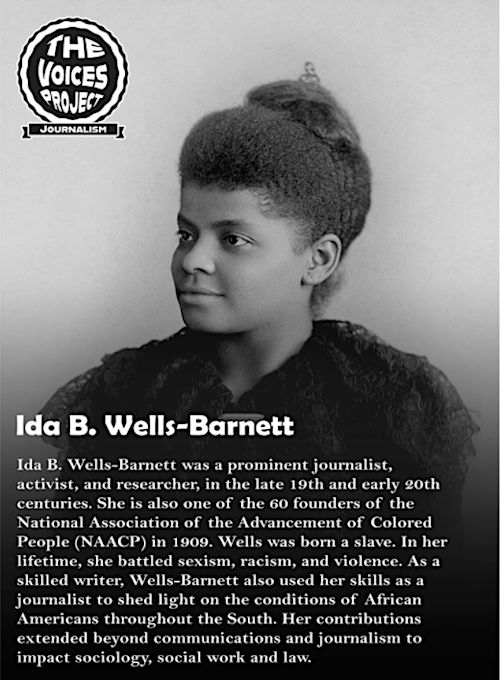 The Voices Project, a new experiential learning project in conjunction with NMC’s Embrace the Dream Martin Luther King/Black History Month programming, aims to elevate the recognition of lesser-known individuals throughout history, like Capt. Hugh Mulzac, journalist Ida B. Wells-Barnett and nurse Mary Eliza Mahoney.
The Voices Project, a new experiential learning project in conjunction with NMC’s Embrace the Dream Martin Luther King/Black History Month programming, aims to elevate the recognition of lesser-known individuals throughout history, like Capt. Hugh Mulzac, journalist Ida B. Wells-Barnett and nurse Mary Eliza Mahoney.
Taking place in campus hallways through the end of the month, the Voices Project is part open-access history lesson, part diversity and inclusion showcase and is aligned with the Diversity, Equity and Inclusion area of NMC Next, the college’s new strategic plan. The poster-size portraits of Black Americans hang in the academic buildings corresponding to their subject’s field – from the first Black registered nurse (Mahoney) to the first Black merchant marine naval officer to command an integrated crew during World War II (Mulzac) to journalist and NAACP co-founder (Wells-Barnett) who was born into slavery.
The posters were designed by Fine Arts student Gavin Bebb.
“I think there’s a strong connection between art and social issues. I felt honored to be a part of the project and helping to bring awareness to others,” said Bebb, 21, of Traverse City. “These are unsung individuals who really changed how we progress in our world today.”
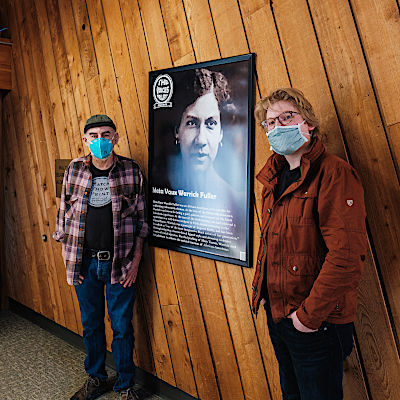
Fine arts instructor Glenn Wolff (right, with Bebb, far right) approached Bebb about the experiential learning project at the end of 2021. From a faculty-curated list of potential subjects, Wolff obtained images in the public domain or permission to use them. Bebb then created the Voices Project logo and edited the images into portraits, cropping, magnifying and manipulating small original files into the 30 x 40 posters.
“All the things I learned over the fall semester I put into these posters,” he said.
Each also includes short biographical text researched by NMC faculty, and a QR code that a viewer can scan for the complete list of poster subjects.
“To me a desired outcome is that students, when they view the posters in their various areas at NMC, discover these Black contributors and are inspired to learn more about, and reflect on, the importance of their stories, and the reasons for their relative absence,” Wolff said.
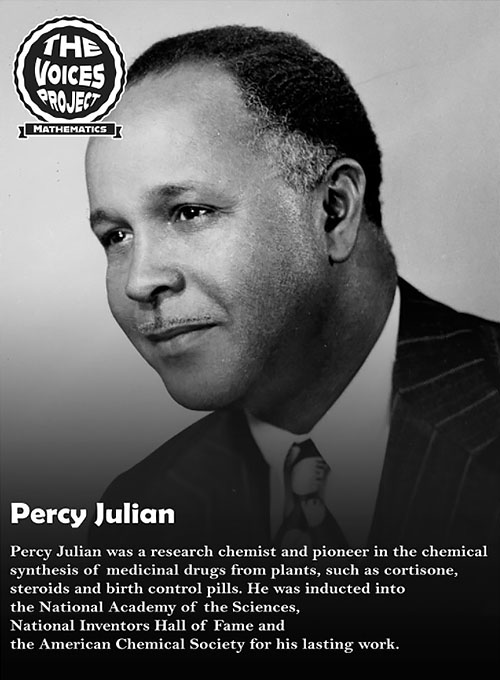 Wolff was able to obtain permission for 17 images. Other portrait subjects are research chemist Percy Julian, mathematician Gladys West and artist and illustrator Aaron Douglas. Wolff’s drawing students are now working on sketches for another five subjects for whom permission could not be obtained.
Wolff was able to obtain permission for 17 images. Other portrait subjects are research chemist Percy Julian, mathematician Gladys West and artist and illustrator Aaron Douglas. Wolff’s drawing students are now working on sketches for another five subjects for whom permission could not be obtained.
“It’s morphing into student artwork,” he said.
The Voices Project posters will be on display at least through February. Wolff envisions it becoming an annual event.
Nov 27, 2022 | Intercom, Student News
September 2, 2020
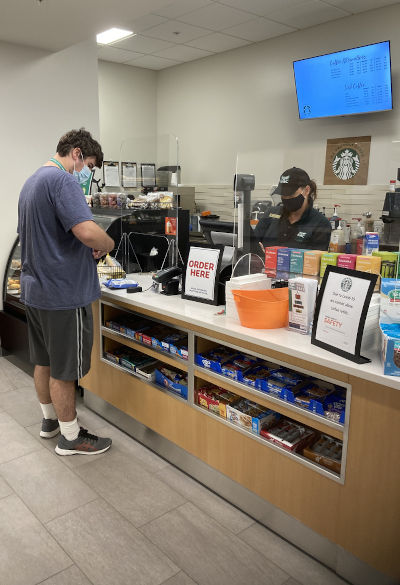 Kyle Korson gets food at the Hawk Owl CaféMasked students, faculty and staff members returned to a campus transformed in response to the coronavirus pandemic, as completely overhauled fall classes began last week in new instruction formats, with safety and learner success top-of-mind.
Kyle Korson gets food at the Hawk Owl CaféMasked students, faculty and staff members returned to a campus transformed in response to the coronavirus pandemic, as completely overhauled fall classes began last week in new instruction formats, with safety and learner success top-of-mind.
“We know some parts of the college experience will be different,” NMC President Nick Nissley said in a welcome video message to students. “Our faculty and staff are still here for you, in more new ways than ever before, to help you reach your goals.”
NMC’s fall learning plan is safety first, offering most classes remotely. It’s the reverse of 2019, when 83 percent of courses were offered in traditional face-to-face lecture format. This fall, only 13 percent are. Livestream debuts as a brand-new format. More than a third of classes are offered livestream, with an instructor teaching online at established days and times.
“Our instructors spent the summer learning how to make virtual learning even better,” Nissley said.
Classes are also offered in on-demand online format, hybrid, and in person where required for accreditation, such as nursing.
Nursing student Kendall McNitt had planned to transfer to NMC from Saginaw Valley State University pre-pandemic, but the safety and flexibility NMC is offering students in this unique semester has affirmed she made a good decision. She’s closer to her East Jordan home, in smaller classes and paying more affordable tuition. Her classes are a mix of all the formats.
“So far, everyone’s been very on top of the guidelines,” McNitt said of safety requirements like mandatory masks and social distancing in classrooms. “All of the nursing professors, they’re super willing to help.”
First-year student Kyle Korson, an East Hall resident, is taking all his classes online, but is grateful to be living on campus for the reliable wireless Internet connection. He lives in Leelanau County near Northport and said connectivity from his home is poor, and wouldn’t allow for livestreamed classes.
“It’s good to get away,” added the engineering student.
On-campus housing occupancy is at about 50 percent of capacity, to allow for social distancing. Fellow East Hall resident Lukus Herblet is glad to be living on campus and that some of his audio technology classes are in hybrid format, combining online and face-to-face instruction.
“I feel it’s part of the college experience,” he said.
New to this year’s college experience: Hand sanitizer stations in all building entrances, with complimentary face masks available to help visitors comply.
Also, the Timothy J. Nelson Innovation Center is now open after almost two years of construction. The first-floor Hawk Owl Cafe and the new second-floor library are open to students, faculty and staff, with occupancy limited to about 50 percent of capacity. Public seating areas have also been marked so that visitors maintain a minimum six feet of separation.
“It’s pretty nice to have everything in one place,” Herblet said.
McNitt, settled into one of the booths by the cafeteria, agreed.
“It’s definitely not a normal experience, but so far, it’s been good,” she said.
Nov 27, 2022 | Intercom
December 30, 2014
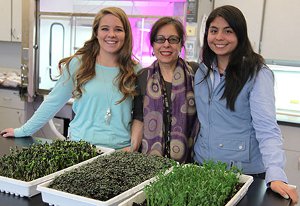 How do you get girls interested in STEM (Science, Technology, Engineering and Math) fields?
How do you get girls interested in STEM (Science, Technology, Engineering and Math) fields?
Consider showing them some stems.
Real, live, green ones, that is, with leaves growing. Put the girls — young women, really — in charge, from planting the microgreens to tending them to monitoring them. Charge them with running experiments and collecting data, like whether the greens grow better under fluorescent lights or LED lights, and whether plain water or fish tank water is more nourishing. Let them harvest, and judge which kind tastes best.
That’s what intern Karla Vega and student Taylor West did this semester in a lab on NMC’s Great Lakes campus. The pair forged a research partnership that not only bridged language and cultural barriers but helps lay the groundwork for sustainable, indoor agriculture that could eventually improve the diets of millions.
“To get girls engaged in science we need to let them make decisions, give them room to make mistakes and try things out on their own,” said NMC Water Studies Institute Education and Outreach Coordinator Constanza Hazelwood, who supervised Vega and West’s research this semester.
NMC and EARTH University
Vega is a Bolivian student at EARTH University in Costa Rica, a leading institution in agricultural sciences and sustainable development. Hazelwood has cultivated connections at EARTH since 2009 and was looking to take the hydroponic vertical agriculture project she started a year ago to the next level. Enter Vega on a semester-long internship.
“Karla came with a lot of expertise in what we’re doing. She brought a lot of innovation to what we’re doing in the lab,” Hazelwood said.
The challenge of the vertical agriculture project bonded Vega, 20, who studies agronomy and natural resources management in Costa Rica, and West, 21, whose science interest was piqued in a high school agriscience program.
“People say, ‘why agriculture when you are from a city?’” said Vega, whose home city, Cochabamba, is home to almost 2 million people. “It was a challenge. This project can be used inside cities, where they don’t have space to grow crops.”
“That’s what women like, is a challenge,” said West.
The challenge will continue next semester, when West will visit Vega at EARTH, joining Hazelwood’s fifth study abroad trip to Costa Rica.
“The tables are going to be turned,” said West, who said her Spanish skills are negligible but expressed no concern about immersing herself in the language.
Hazelwood, too, has no doubts both students will continue to flourish. She notes that the pair made the greatest gains after the male student who originally supervised the vertical agriculture project left.
“They believe in themselves. They’re very self-confident,” she said. “It is about believing in them, at times it is getting out of their way, but always being available to support them.”
Nov 27, 2022 | Intercom, Student News
April 21, 2021
Amid abundant challenges, bright spots and silver linings are still plentiful as NMC’s first full academic year under COVID-19 restrictions draws to a close.
Recapping the challenges: For safety, about 85 percent of NMC’s classes were offered remotely in both fall 2020 and spring 2021 semesters, a complete flip of the usual proportions. College and student events both pivoted to virtual, changing the feel of the campus community. Two brand-new state workforce investment programs, Futures for Frontliners and Michigan Reconnect, were built and unveiled, and COVID safety precautions kept Dennos volunteers at home.
Classes and student events
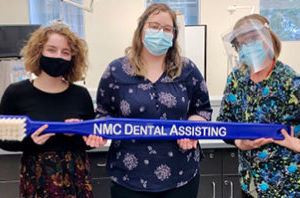 Due to their accreditation requirements, health programs like dental assisting and nursing were among the few holding face to face classes in 2020–21.
Due to their accreditation requirements, health programs like dental assisting and nursing were among the few holding face to face classes in 2020–21.
“We had a great group of students who realized there might be a few bumps in the road, but were always grateful to be face-to-face,” said Dental Assistant Program Director Deb Kaser.
There were no cases of COVID-19 among her students, thanks to social distancing and triple precautions: masks, face shields, and eye protection. Just two students had to quarantine due to household members’ illness, but they were able to keep up thanks to online instruction and proctored testing.
Director of Advising Lindsey Dickinson said that virtual options have been a silver lining for her office, too, especially for students who are parents or have transportation issues.
“It has leveled the playing field in terms of access. Sometimes, getting people to campus was the biggest barrier,” Dickinson said. “We can still build relationships with our students.”
She is especially proud of the fact that the annual Career Fair — one of the last in-person college events in March 2020— carried on in a virtual format in March 2021.
“We had 12 students who got interviews off the back of that Career Fair,” Dickinson said.
Financial aid
2021 opened with three immediate priorities: Distributing $1 million in federal emergency student aid approved in 2020; awarding aid for the state’s Futures for Frontliners program, and aid for Michigan Reconnect. Both Frontliners and Reconnect cover in-district tuition for students who worked during the initial pandemic shutdown in spring 2020 (Frontliners) or are age 25 and lack a college degree (Reconnect.)
The two programs were the first new aid in decades, said NMC Financial Aid Director Linda Berlin. In addition, Frontliners drew a much larger response than expected— more than 1,800 students, according to admissions director Cathryn Claerhout. For spring, 529 enrolled at NMC.
“We had no system set up to handle it,” Berlin said. But NMC’s Information Technology Services stepped up.
“NMC is better positioned than a lot of schools. Our IT, they rocked,” Berlin said. Using the new systems, NMC has awarded $403,000 in Frontliners scholarships with another $83,000 pending for fall.
Awards for Michigan Reconnect start this summer. Also coming up for Berlin’s team: Awarding another $2 million in emergency student aid through the federal American Rescue Plan.
After an initial shutdown, since August 2020 the museum has remained mostly open to the public, albeit with limited hours. Events like concerts and artist workshops are still virtual, however.
“We’ve gotten really good at Zoom programs,” said Executive Director Craig Hadley, noting the Dennos has virtually presented artists from as far away as Iceland.
A silver lining has been new partnerships. The Dennos recently pooled grants funds with Manistee’s Ramsdell Center for the Arts to present Windy City Blues, a virtual concert featuring two Chicago artists neither could have afforded on their own. Offered free online, it led to about 35 new subscribers to the Dennos YouTube channel.
“We definitely are reaching new audiences,” Hadley said. “It’s been an opportunity to expand our reach, and who we’ve been able to engage.”
Volunteers have begun to return to the museum, and Hadley looks forward to increasing their numbers, which will allow the museum to expand hours beyond the current Sunday–Thursday.
“That’s going to get us weekend coverage,” Hadley said.
Phi Theta Kappa
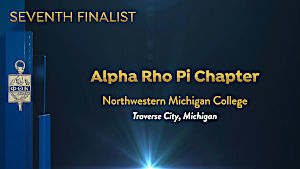 Despite a mostly virtual year, NMC’s chapter of the international community college honor society had its best showing ever, ranking as one of the top 10 most distinguished chapters for the first time in its history.
Despite a mostly virtual year, NMC’s chapter of the international community college honor society had its best showing ever, ranking as one of the top 10 most distinguished chapters for the first time in its history.
“It was amazing. It was a sort of out of body experience,” said chapter president Amber Marsh of the countdown at the PTK conference where the No. 7 rank was revealed.
On the heels of the rank, Marsh also learned that the NMC chapter’s honors in action project, Deconstructing the Binary Complex in Racism, was selected to be published in Civic Scholar, PTK’s journal of undergraduate research, this summer. She’s thrilled that “the work that we became so passionate about” as the nation began to reckon with racial justice last summer will now reach a wider audience.
“You have a great chance to change minds,” she said.
The classes of 2020 and 2021 will both graduate in a modified, COVID-compliant walk-through commencement ceremony on May 1.
Nov 27, 2022 | Intercom, Student News
May 10, 2017
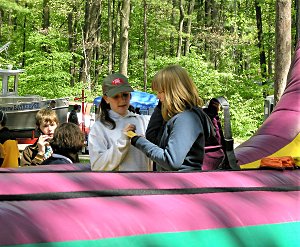 Samantha Oleson at the NMC Barbecue in 2007For many northern Michigan residents, the annual NMC Barbecue is a spring tradition. For Samantha Oleson, it goes back a lifetime.
Samantha Oleson at the NMC Barbecue in 2007For many northern Michigan residents, the annual NMC Barbecue is a spring tradition. For Samantha Oleson, it goes back a lifetime.
The 22-year-old is part of the fourth generation of the Oleson family to carry on the fundraising picnic under the pines started in 1956 by her great-grandparents, Jerry and Frances Oleson.
This year she formally joined the Barbecue Board, the volunteer committee that spends several months planning the Barbecue, set for May 21 on NMC’s main campus. But the Sunday before Memorial weekend has long been a dedicated date on her calendar.
“I’ve been volunteering since I was seven years old,” Oleson said. She’s never missed a single Barbecue, even during her college years at Western Michigan University. “I would bring my friends and volunteer. It wasn’t something that I felt obligated to do, but I wanted to do.”
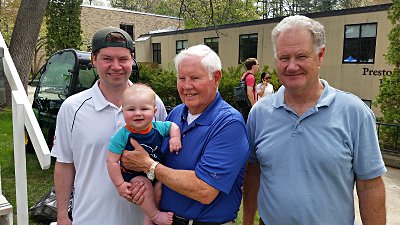 Mark, Frankie, Don and D.J. Oleson: Four generations enjoy the 2015 BarbecueA former dual-enrolled NMC student, Oleson is among a group of four cousins in the fourth generation of the family who now work in the Oleson’s stores. They continue to donate all the food for the Barbecue, which drew 7,678 people in 2016. On May 21, they’ll fan out for different day-of duties. Even fifth-generation Frankie Oleson, age 2 and a half, gets a job.
Mark, Frankie, Don and D.J. Oleson: Four generations enjoy the 2015 BarbecueA former dual-enrolled NMC student, Oleson is among a group of four cousins in the fourth generation of the family who now work in the Oleson’s stores. They continue to donate all the food for the Barbecue, which drew 7,678 people in 2016. On May 21, they’ll fan out for different day-of duties. Even fifth-generation Frankie Oleson, age 2 and a half, gets a job.
“He carried buckets,” said dad Mark Oleson, Samantha’s cousin. “He’s excited.”
They’ll still squeeze in time to enjoy the meal themselves.
“We eat on the steps, right past the serving lines,” Samantha Oleson said. “It’s great to see people come, year and year again, and see how dedicated they are to the college and the Barbecue.”
Besides the meal, the Barbecue includes classroom and program displays, free live music, a veteran’s tent and an alumni tent. Separate ticketed activities include children’s games and a cake walk.
Tickets are $6 in advance ($8 on Barbecue Day) and on sale now online and at Oleson’s Food Stores. Visit nmc.edu/bbq for more information.
Nov 27, 2022 | Intercom, Student News
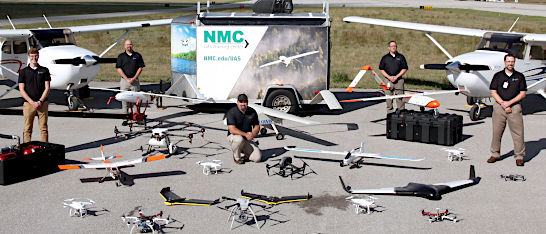
September 16, 2020
This fall NMC celebrates the ten-year anniversary of its Unmanned Aerial Systems (UAS) program, a foresighted curricular addition that has helped diversify northern Michigan’s economy.
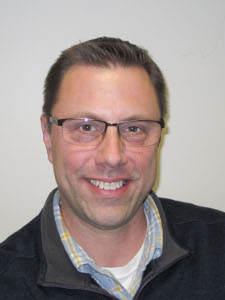 In 2010, UAS, also known as drones, were chiefly a military tool. But Tony Sauerbrey, left, then NMC’s chief flight instructor, and others in the college’s traditional manned Aviation program spied opportunity ahead.
In 2010, UAS, also known as drones, were chiefly a military tool. But Tony Sauerbrey, left, then NMC’s chief flight instructor, and others in the college’s traditional manned Aviation program spied opportunity ahead.
“We started looking at the future of aviation, all this drone technology coming along,” said Sauerbrey, now NMC UAS program manager (far right, above.) “It was a little ahead of its time.”
Years ahead, in fact. Three classes in 2010 grew into a degree with a UAS specialty by 2013. The FAA established its commercial license in 2016. Today, drones are used to inspect crop health and infrastructure integrity, photograph and sell real estate, conduct land surveys and monitor everything from shoreline erosion to invasive species. In the future, Amazon promises drone delivery to customer doorsteps within 30 minutes.
With that significant lead in training time and experience, NMC UAS students have a decided edge in the industry with nearly 200,000 license holders nationwide. (In fact, Amazon employs several.) In northwest Michigan, the industry is growing to occupy a larger niche.
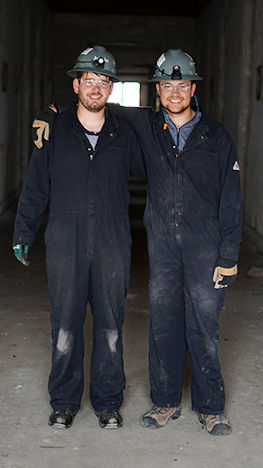 Justin Bentsen, left and Pierce Thomas, right, during the filming of an Interactive Aerial product video. Both 2016 NMC grads, they are two of the company’s four founders.“NMC is the epicenter of all of the robotic and drone companies in the area, with an emphasis on aerial applications,” said Christian Smith, president of Interactive Aerial, a Traverse City company founded by four NMC alumni.
Justin Bentsen, left and Pierce Thomas, right, during the filming of an Interactive Aerial product video. Both 2016 NMC grads, they are two of the company’s four founders.“NMC is the epicenter of all of the robotic and drone companies in the area, with an emphasis on aerial applications,” said Christian Smith, president of Interactive Aerial, a Traverse City company founded by four NMC alumni.
Interactive Aerial is also the 2020 winner of the Emerging Business award sponsored by Traverse Connect, the region’s economic development organization. President and CEO Warren Call said the company exemplifies the organization’s desire to diversify the economy away from traditional employers like tourism/hospitality and agriculture.
“Our mission is to grow family-sustaining careers,” Call said. “The best way to do that is to develop and grow sectors that are technical, high-skill, scientific.”
A year like 2020, where both hospitality and health care, another established regional employer, suffered shows the risk of not diversifying, he said.
“We could be a leader in industries and sectors that deal with remote environments. I would love to see us be known for that,” Call said.
Fittingly, NMC launched the UAS program by partnering with one of the region’s oldest industries. Fruit growers and college supporters Dorance and Julia Amos offered their land in Yuba as a training facility back in 2010.
“For us to have access to airspace that close, that really allowed for the program to develop,” Sauerbrey said.
NMC will continue to play a pivotal role as the industry matures. Locating the program in Engineering Technology, where students learn to build and repair the units, as well as to process and analyze the many different kinds of data generated, is key. In addition, students are taught safe operating practices, airspace, weather, regulations, aerodynamics, and even aeronautical decision making.
“Industry demands more now than simple piloting skills,” Smith said, who credits Sauerbrey for guiding the program to meet industry demands. He left NMC for the private sector in 2014 but returned in 2018.
“I was very passionate about the school and what had been started,” Sauerbrey said. He sees a “second coming” of the industry ahead, as drones begin to fly beyond line of sight and over people.
“The next ten years will be very interesting,” Sauerbrey said. “Drones are not a novelty anymore and have cemented themselves as an invaluable tool in many industries and will continue to do so.”
Specialization, like Interactive Aerial’s concentration in GPS-denied environments, like tanks and boilers, will continue. Another NMC-incubated drone company, Hybrid Robotics, is about five years behind Interactive Aerial. Smith looks to NMC for the new hires he needs, and eventually for entrepreneurial colleagues.
“I hope we can be an inspiration to the next group of kids sitting in that classroom,” Smith said. “I hope that can be a snowball that doesn’t stop.”
Call agrees, adding the remote/robotic industry can help the region attract more than retirees.
“We’ve been losing that core working age demographic. Part of the reason is they have career challenges,” he said. “Developing this industry, we see as a great way to address that goal.”
Read more about the program, courses, instructors and career opportunities at nmc.edu/uas.
Nov 27, 2022 | Intercom, Student News
August 28, 2019
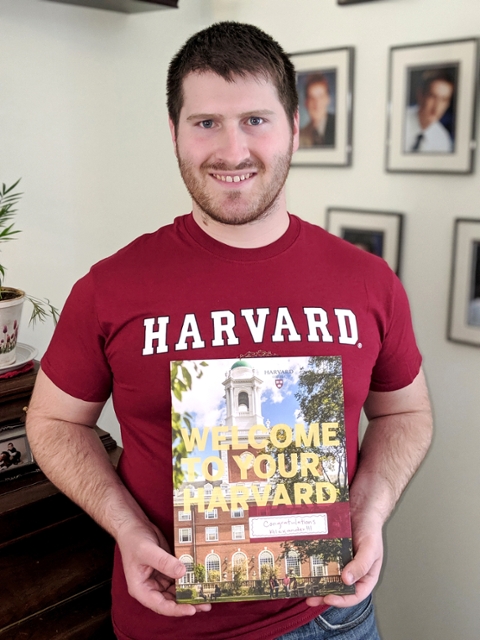 Add up an NMC associate degree, a thin credit history, a stint in the Navy and a love of travel and you get Harvard University sophomore Alex Walsh (NMC 2012), who will start classes in Cambridge, Mass. next week.
Add up an NMC associate degree, a thin credit history, a stint in the Navy and a love of travel and you get Harvard University sophomore Alex Walsh (NMC 2012), who will start classes in Cambridge, Mass. next week.
He’s one of just a dozen transfer students admitted among 1,600 applicants to the most venerable of the Ivy League institutions. But long odds didn’t daunt Walsh, preternaturally disposed to optimism.
“Shoot for the stars, see what happens. The worst they could say is no,” said Walsh, 27, who was also admitted to the University of Michigan and Michigan State. “Being able to find ways to push myself at NMC, challenge myself, helped put me on this path.”
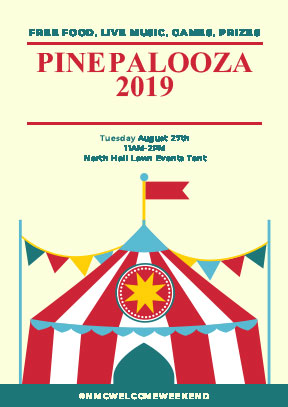 “This path” started with participating in a wide range of activities and clubs at NMC, including NMC magazine, the White Pine Press, Anime Club, International Club and the NMC Policy Council. (NMC yesterday hosted Pine Palooza, an annual fair that introduces students to dozens of campus groups and organizations.) Walsh was also a member of Phi Theta Kappa, the international community college honor society. He credits PTK adviser Kari Kahler and instructors Jim Bensley, Amjad Khan and John Zachman as among his NMC mentors.
“This path” started with participating in a wide range of activities and clubs at NMC, including NMC magazine, the White Pine Press, Anime Club, International Club and the NMC Policy Council. (NMC yesterday hosted Pine Palooza, an annual fair that introduces students to dozens of campus groups and organizations.) Walsh was also a member of Phi Theta Kappa, the international community college honor society. He credits PTK adviser Kari Kahler and instructors Jim Bensley, Amjad Khan and John Zachman as among his NMC mentors.
Yet when he graduated, Walsh didn’t have enough credit history to get the student loans he needed to continue his education. So he joined the military, both for the GI benefits down the road and the opportunity to travel in the short term, a love kindled in the NMC International Club. He chose the Navy specifically because it offered more opportunity to travel than other branches, and lived in Spain for more than three years and visited 25 different countries.
In 2017 he took the SAT and scored higher than he expected. Though Ivy League schools are notoriously picky about transfer students, he decided to add Harvard, Princeton and Yale to his list when his Navy contract was up. A veteran transition program, Service to School, also matched him with a mentor whom Walsh said was vital in the decision process.
He’ll enter Harvard as a sophomore and plans to major in economics and minor in government, likely international relations. An MBA or law school could follow. Walsh hopes to work in a capacity that grows the global economy, staying in touch with his love of international relations.
“I would like to be on some kind of a career path where I can provide opportunities to those who would not otherwise have opportunities,” he said. Options he wants to explore through internships include working with infrastructure and business development in central America or Asia, working with refugees of war or conflict, and serving in the Foreign Service as an economic or political adviser.
Between the GI Bill®, Harvard scholarships and grants, Walsh said his entire tuition bill will be covered.
“That’s pretty exciting too,” he said.
GI Bill® is a registered trademark of the U.S. Department of Veterans Affairs (VA). More information about education benefits offered by VA is available at the official U.S. government Web site at https://www.benefits.va.gov/gibill.
Nov 27, 2022 | Intercom, Student News
May 15, 2019
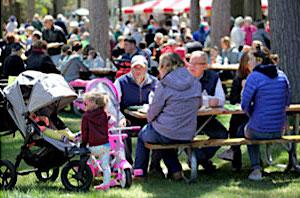 Patrons enjoying the traditional buffalo burger and kids games might also notice a giant crane and the steel beamed-frame of a rising second story on the Timothy J. Nelson Innovation Center at the annual NMC Barbecue this Sunday.
Patrons enjoying the traditional buffalo burger and kids games might also notice a giant crane and the steel beamed-frame of a rising second story on the Timothy J. Nelson Innovation Center at the annual NMC Barbecue this Sunday.
Begun last fall, the West Hall renovation and the Commitment scholarship for promising, mostly first-generation college students are the beneficiaries of funds from this year’s 64th annual picnic under the pines, set for 11 a.m. to 5 p.m. Sunday on main campus.
“The NMC Barbecue has a long and proud history of investing in the future of our region, whether it’s through the students themselves, or by creating the learning spaces they need to succeed,” said Barbecue Board President Heather Jewell. “It’s exciting to know a $6 picnic meal can have such an incredible impact when we all join together to support our college.”
Originally a residence hall, the Timothy J. Nelson Innovation Center is set to reopen next spring as a 54,000-square-foot, multi-story library and flexible learning space accommodating a range of learning styles and needs, including experiential and simulation. Since 1993, the Commitment scholarship has offered full-tuition scholarships to 1,500 students from all around the region, positioning them to transfer and complete a bachelor’s degree.
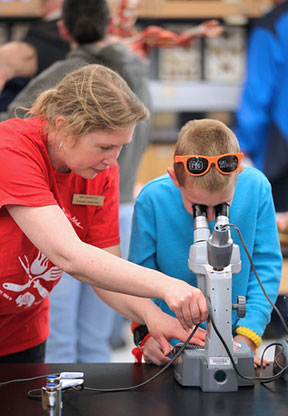 The Barbecue traditions of free live entertainment, classroom displays and program exhibits, and free admission to the Dennos Museum Center will all return. New at the Barbecue is the first annual printmaking sale, set for 11 a.m.-5 p.m. in the Fine Arts Building. Patrons can take home a student print for as little as $3. See the complete list of activities and events.
The Barbecue traditions of free live entertainment, classroom displays and program exhibits, and free admission to the Dennos Museum Center will all return. New at the Barbecue is the first annual printmaking sale, set for 11 a.m.-5 p.m. in the Fine Arts Building. Patrons can take home a student print for as little as $3. See the complete list of activities and events.
In addition to supporting college programs and equipment — to the tune of $1.8 million since the late Gerald W. Oleson and his wife Frances, founders of Oleson’s Food Stores, started it in 1956 — the Barbecue is a place where community connections flourish. More than 500 volunteers put on the Barbecue. Additional volunteers are still welcome, especially in the following areas. Sign up online.
- Kids Games – 3–5 p.m.
- Recycling Champions – 2–5 p.m.
- Hot Dog Cookers – 2–4 p.m.
- Buffalo Wranglers – 3–5 p.m.
- Serving line (this job is for community groups) – 2–5 p.m.
Tickets are $6 in advance and can be purchased at Oleson’s Food Stores, the Traverse City Area Chamber of Commerce, the NMC Foundation, and many financial institutions. Tickets are available for $6 plus a $1.25 service charge on MyNorth Tickets. Tickets are $8 on Sunday.
Nov 27, 2022 | Intercom, Student News
January 22, 2018
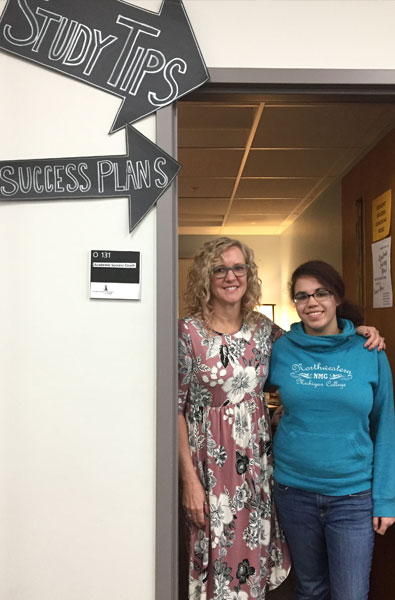 NMC success coach Leeann Fountain and student Taylor ByersWhen Taylor Byers returned to NMC last fall, four years after she last attended, she knew she had to be a different kind of student.
NMC success coach Leeann Fountain and student Taylor ByersWhen Taylor Byers returned to NMC last fall, four years after she last attended, she knew she had to be a different kind of student.
But she didn’t seek help from an academic adviser, or a tutor, or even an instructor. Instead, Byers beelined for a student success coach.
Success coaching is booming at NMC. Already this year, coaching visits to the Student Success Center are double the 2016-17 total. Rather than being subject matter experts in math or English or science, like instructors or tutors, coaches guide students to academic success by providing tools to improve study habits, time management and task prioritization.
“It’s going so much better,” said Byers, 22, who is studying visual communications. “It helps you stay accountable. They teach you how to organize your life.”
Not just on campus, either. Byers’ coach, Leeann Fountain, had her fill in a 24-hour time chart, breaking the entire day into half-hour increments. Something stood out right away.
“Taylor wasn’t going to bed,” Fountain recalls. Without a standing bedtime, she was tired and couldn’t focus on studying. She napped erratically, which threw her time management off further.
But Fountain didn’t tell Byers what her bedtime should be, or even to set one. Rather, after Byers filled out the whole, 24-hour chart, Fountain said, “I asked her, ‘what would you change first?’ “
It was Byers who decided that first thing was to establish a bedtime, picked 10 p.m., and now sticks to it. Between her four days of classes, her job as a manager at the Arby’s in Kalkaska, where she also lives, and her commute time, that now leaves her evenings to study, alert and focused.
Posing the question for Byers to answer herself is a fundamental concept of the empowerment coaching style that NMC employs.
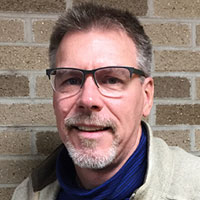 “So many of us have experienced education as something that’s being shoved into us,” said Steve Rice, an accounting instructor at NMC and the author of an innovation grant that allowed a seven-member team to be trained in the style in 2015. The goal is to empower students to solve their own problems, as Byers did.
“So many of us have experienced education as something that’s being shoved into us,” said Steve Rice, an accounting instructor at NMC and the author of an innovation grant that allowed a seven-member team to be trained in the style in 2015. The goal is to empower students to solve their own problems, as Byers did.
Even with this year’s jump, only a small fraction of students receive coaching — 280 so far this year.
“It’s very much in the germinal stage,” Rice said.
Ashley Darga, NMC’s coordinator for Student Success and one of the team trained back in 2015, wants to accelerate it. In addition to the face-to-face coaching that Byers received, her office is piloting required phone coaching in three online classes: Rice’s accounting, a math class, and a history class. While there are variables in the data, results so far are encouraging: Across all three classes, students who got coaching received failing grades 8 percent less often and passing grades (defined as a 2.0 or higher) almost 11 percent more. Withdrawal rates for coached students were 5 percent lower as well.
“It’s giving us a really preliminary look at is this worth pursuing, and so far we feel encouraged,” Darga said. “I’m maxing out my personnel budget for (coaches).”
Coaching also establishes the kind of personal relationship that research has found is critical for students to complete their degree.
“This is designed in that spirit, hooking a student up with a person so they are engaged on campus and feel committed to NMC,” Darga said.
“Without persistence we’re not using our time wisely,” Rice said.
Nov 27, 2022 | Intercom, Student News
March 17, 2021
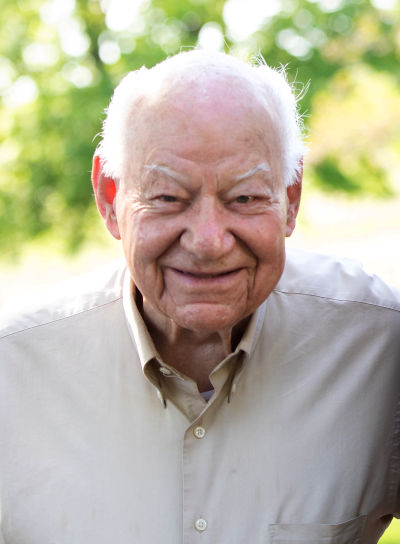 For more than three decades, Traverse City resident Dick Grout (right) has pushed NMC’s mission to provide lifelong learning opportunities to its outer limits.
For more than three decades, Traverse City resident Dick Grout (right) has pushed NMC’s mission to provide lifelong learning opportunities to its outer limits.
The 100-year-old World War II veteran’s Extended Education class records go back to 1988. He’s currently enrolled in a class on the history of U.S. presidents. It’s one of several Grout has taken from Jack Segal, who at 75 was born the year the war ended, in part thanks to Grout’s service.
“I just think it’s important to keep challenged mentally,” said Grout, a widower who lives at the Cordia senior living residential community in Traverse City. “I don’t want to sit here by myself and vegetate. I want to be involved with other people.”
Since COVID hit, Extended Education classes have been virtual, but Grout’s taken the videoconferencing technology in stride.
“We certainly would rather be in person, (but) there’s all kinds of ways to get together,” he said.
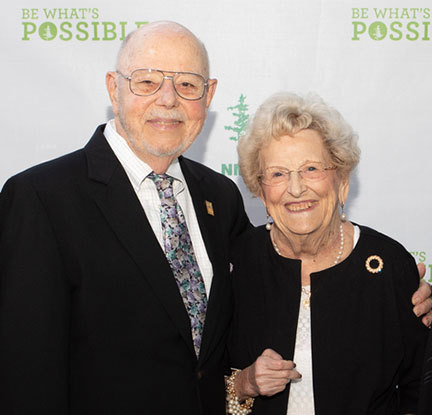 Ken Pickering and Jeane PoosGrout’s not the only centenarian student at Extended Education, either. Jeane Poos turns 100 this month. She and her devoted partner Ken Pickering, 95, have a lengthy transcript of EES classes between them. They too have taken Segal’s classes, as well as culinary courses, art and music and getting the most from your iPhone. They’ve been on the instructor side, too, presenting on their travels including a trip to Norway and Russia at Extended Ed’s twice-annual Campus Days.
Ken Pickering and Jeane PoosGrout’s not the only centenarian student at Extended Education, either. Jeane Poos turns 100 this month. She and her devoted partner Ken Pickering, 95, have a lengthy transcript of EES classes between them. They too have taken Segal’s classes, as well as culinary courses, art and music and getting the most from your iPhone. They’ve been on the instructor side, too, presenting on their travels including a trip to Norway and Russia at Extended Ed’s twice-annual Campus Days.
“We had two rooms full of 50 people,” Pickering recalls.
Poos in fact has created a planned gift for Extended Education so that others may take advantage of the opportunities it offers to all learners, from age 4 to 100, at least.
Visit nmc.edu/ees for information on current classes. Visit nmc.edu/give to find out about planned and other giving opportunities.
Listen to an interview Grout did with the International Affairs Forum at NMC, which he formerly chaired, to commemorate the 75th anniversary of World War II.
Nov 27, 2022 | Intercom
June 1, 2016
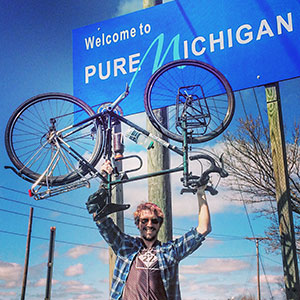 Pauly Hurlbert at the Michigan border on his way home Planning to try Smart Commute Week next week? It just might change your life.
Pauly Hurlbert at the Michigan border on his way home Planning to try Smart Commute Week next week? It just might change your life.
Last year, Pauly Hurlbert had never ridden his bike further than Traverse City to Suttons Bay — a long-ish commute distance. Yet on September 10, the NMC aviation alumnus and certified flight instructor embarked on a West Coast bike tour from Vancouver, British Columbia. He wasn’t sure he’d like pedaling thousands of miles, but keen on the personal discovery and adventure he anticipated along the way, Hurlbert committed to ride to Tijuana.
By the time he reached the Mexican border November 28, Hurlbert not only liked bicycle touring, he was hooked. He turned east, bound for Florida. After a month there he turned north, arriving home in Traverse City in early April having logged 6,138 miles.
“Border to border, coast to coast, and then back home,” said Hurlbert, a 2008 alumnus originally from Kalamazoo. He carried about 120 pounds of gear and camped about half the time.
Now back in a more regular routine that includes bartending, playing music and teaching flight instructor students, Hurlbert, 30, said he applies lessons from the bike tour daily. Chief among them is patience, something that can be hard to impart to students always anticipating what comes next.
“They’re thinking about flying jets, when they’re here teaching students,” he said of his flight instructor students. “Teaching is such a valuable life experience. While they’re here and teaching, make the most of it.”
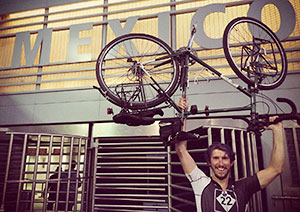 Another lesson: Deliberately step out of your comfort zone. Hurlbert practiced this from day one of his trip, which at 65 miles was twice as far as he’d ever ridden before.
Another lesson: Deliberately step out of your comfort zone. Hurlbert practiced this from day one of his trip, which at 65 miles was twice as far as he’d ever ridden before.
“It makes you more comfortable with everything,” he said. He loves to see students taking that risk, recalling one international student who arrived a few years ago with minimal English. This spring, she took her exam to become a flight instructor.
“Now she’s a day away from teaching people how to fly,” he said. “It’s pretty amazing.”
Hurlbert isn’t sure what’s in store for him after the summer semester.
“Not having plans forces you to make challenging choices more regularly,” he said. “It makes you more comfortable and confident.”
But it’s likely he’ll eventually climb back aboard Charlotte, the road bike that carried him to innumerable scenic vistas, milestones like the Mexican border, and personal highlights like riding down Morgan, his childhood street in Kalamazoo. Hurlbert recalled traversing it on training wheels.
“When I was a kid, that was my bike tour,” he said. “Now the nation. Hopefully the world, eventually.”
Nov 27, 2022 | Intercom, Student News
February 17, 2021
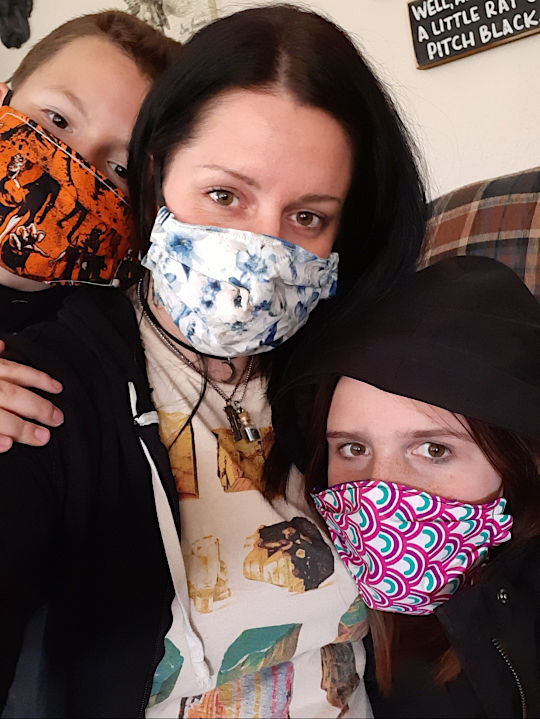 After investing more than 10 years in pursuit of her associate degree, the pandemic almost brought psychology student Brandee Sasser-Drone (left) to her breaking point, but federal aid distributed by NMC has kept her on track to graduate this semester and continue toward a bachelor’s degree.
After investing more than 10 years in pursuit of her associate degree, the pandemic almost brought psychology student Brandee Sasser-Drone (left) to her breaking point, but federal aid distributed by NMC has kept her on track to graduate this semester and continue toward a bachelor’s degree.
The 35-year-old mother of two has twice received emergency financial assistance, in the spring of 2020 and again just this month. This second round of COVID-19 aid is part of the $22.7 billion Congress allocated to higher education in the Coronavirus Response and Relief Supplemental Appropriations Act (CRRSAA) passed in December 2020. NMC received $4.1 million total, of which $1 million was earmarked for direct student aid.
Sasser-Drone received $1,200 of that, one of more than 900 NMC students who received funds this month based on financial need and enrollment status. The average award was $964.
“This last little bit of money, I paid bills that have been on the back burner since summer,” she said. “We’ve been living off of one cell phone, one car. I had to let car insurance lapse. Really vital, important things that NMC has helped us get back to a secure place.”
Nursing student Shelby Hansard, 26, who also received assistance in both rounds, agreed. She too juggles parenthood of an 18-month-old daughter with work as an LPN and school.
“The funds were helpful and allowed me to buy groceries for my family this month as well as a textbook that I really needed,” Hansard said.
The pandemic upset all Sasser-Drone’s financial security, from a paycheck to child support for her 11- and 8-year-old, and added demands like supervising their virtual education at home.
“All of our usual, consistent financial securities, as small as they were, they weren’t coming in,” she said. “I didn’t think I’d be able to finish school.”
The dean’s list student credits NMC psychology instructor Shiloh Smith for providing emotional support during the last semester.
“Shiloh kept me so motivated, so driven,” Sasser-Drone said. “I’m four-pointing my classes, which gives me a lot of pride.”
It’s also given her admission to Central Michigan University to finish her bachelor’s degree. She found out this week she was accepted to an online program starting this fall. She hopes to eventually work in mental health services within a law enforcement or correctional setting.
“I wouldn’t have been able to continue if it wasn’t for this help this year, and the NMC staff,” she said. “I highly recommend NMC to anyone who’s thinking about going to school.”
NMC developed a system to quickly and automatically distribute 85 percent of this round of student aid to those who qualified. An application process opens Thursday to award the remaining funds. Students will be notified directly how to apply, and the entire $1 million is expected to be distributed by mid-March.
The NMC Foundation’s Be What’s Possible campaign also has supported the emergency needs of students during the pandemic through the Fund for NMC. Give to the campaign here.
The $3 million NMC will receive in institutional funds this round must be used for expenses that are directly related to COVID. NMC will look at infrastructure improvements related to health and safety in buildings, and technology improvements.
“This financial support is critical to helping NMC meet the needs of the learners of our region” said Nick Nissley, NMC president. “In 2020, we pivoted quickly and made major changes to keep delivering education, while also keeping our students and employees safe, all without raising tuition. While we are proud of the work we’ve done to balance the budget so far, we know that some of those adjustments are one-time fixes. The pandemic will have a longer lasting impact on many industries, including higher education and we need to continue to look for ways to right the ship.”
Nov 27, 2022 | Intercom, Student News
December 16, 2015
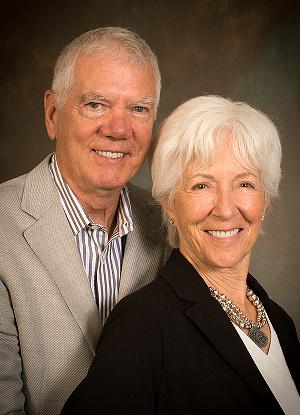 Inuit art lovers Dudley and Barb Smith know their collection intimately.
Inuit art lovers Dudley and Barb Smith know their collection intimately.
There’s the walrus sculpture in the foyer of their Suttons Bay home, the one they turn around when their youngest grandson visits, so his two-year-old fingers stay safe from the sharp tusks.
In their shared office, there’s the caribou that presides between the desks. On the bedroom wall there’s Barb Smith’s favorite print, of a mother bear and two cubs. On the mantle there’s the transformation sculpture that Dennos Museum Center executive director Gene Jenneman helped their kids choose as an anniversary gift. On the shelves surrounding the fireplace — which they had strengthened to support the weighty stone sculptures — are pieces collected on other travels, to Vancouver, Toronto, Montreal and Santa Fe, over the 30 years since the couple first fell in love with Inuit art at the Dennos Museum.
Now, the Smiths are affording the opportunity for more people to appreciate the art of the aboriginal Canadian Arctic people, with a $1 million gift that will more than double the gallery space for the Dennos’ signature collection of Inuit art.
“It is hard to beat what we have at the museum,” Barb Smith said. “It’ll be nice to see more of it.”
The addition will wrap around the existing Inuit gallery. It will also add space for the Dennos Museum Store and storage for the Inuit collection, which now includes nearly 1,500 works. Started by librarian Bernie Rink in 1960, the growth of the Inuit collection was a driving force behind the creation of the Dennos Museum Center 25 years ago.
“What a fitting way to celebrate our anniversary, by honoring the very artwork that built a reputation for the Dennos as an international leader,” Jenneman said. “This expansion will allow us to grow and refine our collection, securing the Dennos as one of the noted museums world wide for Inuit art.”
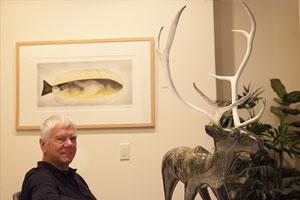 Per their estate plans, eventually the expanded gallery will house the walrus, the caribou, and the rest of the Smiths’ collection, which reflects both Barb Smith’s affinity for animal imagery and Dudley’s for the native people.
Per their estate plans, eventually the expanded gallery will house the walrus, the caribou, and the rest of the Smiths’ collection, which reflects both Barb Smith’s affinity for animal imagery and Dudley’s for the native people.
“I like the primitive nature of the art, the shaman images,” he said.
Construction for the Inuit gallery expansion as well as the addition of two new galleries at the Dennos is expected to begin in 2016.
Read more about the Smiths’ gift here »
Nov 27, 2022 | Intercom, Student News
May 11, 2022
NMC resumes its place as a leader in short-term study abroad experiences, with 50 students from multiple academic areas traveling to the United Kingdom, France, Spain and Colombia this spring.
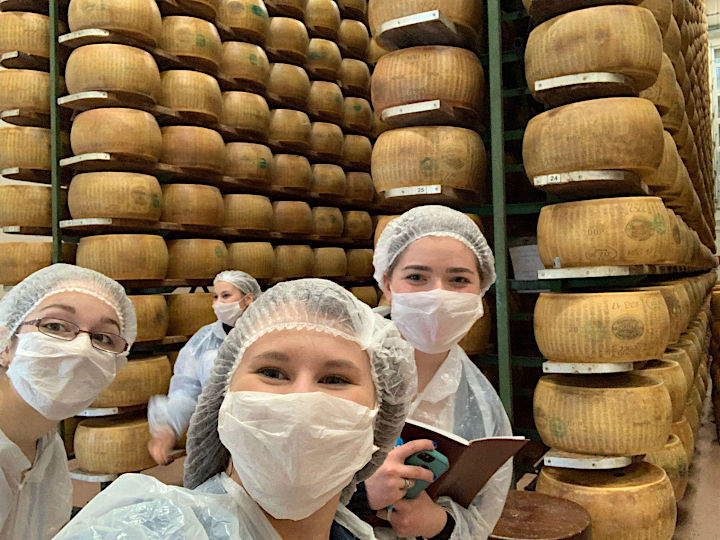 NMC study abroad students in Parma, ItalyNMC students haven’t studied abroad since 2019 due to the COVID-19 pandemic, and many colleges are still hesitant to travel, said Jim Bensley, director of International Services and Service Learning.
NMC study abroad students in Parma, ItalyNMC students haven’t studied abroad since 2019 due to the COVID-19 pandemic, and many colleges are still hesitant to travel, said Jim Bensley, director of International Services and Service Learning.
“We are on the leading edge,” said Bensley, who will co-lead a group of 16 humanities students bound for Paris and Normandy, France next month. It’ll be his eighth destination with NMC and second time in Europe. “I am itching to get on that plane and get my feet on the ground in France,” he said.
Study abroad trips are one form of experiential learning and required for the global endorsement credential NMC began offering eight years ago. Bensley said that global experiences add another dimension to classroom education.
“They feel like they are a better student and much more prepared for the job market,” he said of past global endorsement recipients.
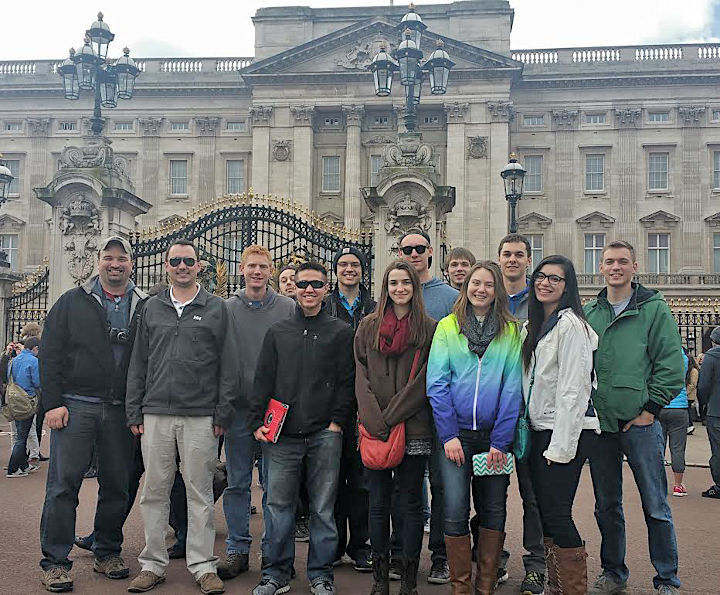 NMC study abroad students en route to South Africa from LondonNMC also offers up to $1,000 Global Opportunities scholarships to defray the cost of the study abroad experiences.
NMC study abroad students en route to South Africa from LondonNMC also offers up to $1,000 Global Opportunities scholarships to defray the cost of the study abroad experiences.
Three of the four 2022 destinations are new for NMC. This week,13 nursing students departed for the UK, a previous destination for aviation students, and 15 culinary students set off for Spain. Six Water Studies students will be in Bogota, Colombia from June 1–12. That trip is the first half of an exchange created by a grant NMC submitted with the Universidad de La Salle, “Bridging Waterways across the Americas.” The Colombian students will come to Traverse City June 14–25.
A fifth global experience is also slated for this summer. NMC student Edward Goloson has been selected by the French Embassy to participate in its community college summer bootcamp. Goloson will spend two weeks in Grenoble, France with an environmental science program, Mountains in a Changing World.
Nov 27, 2022 | Intercom
May 6, 2015
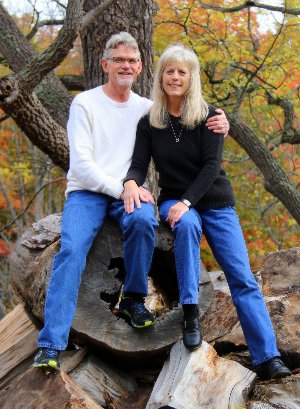 First comes love, then comes marriage. Then comes a baby carriage, satisfying careers, buffalo burgers, saving money through dual enrollment, and supervising the beanbag toss.
First comes love, then comes marriage. Then comes a baby carriage, satisfying careers, buffalo burgers, saving money through dual enrollment, and supervising the beanbag toss.
That’s Barb Mort’s story, anyway. The alumna and Traverse City resident has a bird’s eye view of NMC, having seen the college as a student, parent, volunteer and colleague. Whatever lens she’s looking through, Mort says the view is always the same: Impressive.
“I’m just so proud that such a small community has a world-class college in it,” said Mort, whose story began with a fairy-tale start when she moved into the NMC apartments in 1979. Across the hall lived another student named Greg, from Charlevoix.
“It was truly love at first sight,” she said. “The very first time I met him, I knew I was going to marry him.”
They tied the knot in 1982, and then bride and groom enrolled in what was called Ferris State University’s “off campus program,” a predecessor to the University Center located in the old Maritime building (now site of the Great Lakes campus.)
“Neither one of us would have the careers we have without NMC and the off-campus program,” said Mort, who is now donor relations specialist at the Grand Traverse Regional Land Conservancy. Husband Greg is the business manager of a tool and die company. “It literally saved us tens of thousands of dollars in tuition.”
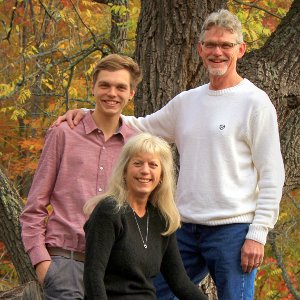 Fast-forward a few decades. The couple’s youngest son, Jackson, a senior at Traverse City West, is now dual-enrolled at NMC. He’s even had one of the same professors his parents did: Math instructor Ernie East.
Fast-forward a few decades. The couple’s youngest son, Jackson, a senior at Traverse City West, is now dual-enrolled at NMC. He’s even had one of the same professors his parents did: Math instructor Ernie East.
“It’s been the best thing for him,” said Mort. “He loves the independence, how the professors teach. The one-on-one help he’s been getting is amazing.”
Mort also sees evidence of NMC’s value when she goes to work. The Conservancy hired an intern through NMC’s business department. He went on to earn a staff position, due to his strong performance which NMC supported, she said.
Mort’s latest role at NMC came about thanks to another quirk of proximity. The Conservancy’s office adjoins Oleson’s, the grocery store chain whose founders started the NMC Barbecue in 1956. The third generation of the family now continues that tradition, led by Brad Oleson, who recruited Mort for the Barbecue Board.
“I saw serving on the BBQ board as an avenue to give back to the college that has made such a difference to my family and community. I am also inspired by the Oleson family, who quietly contribute to so many worthwhile organizations in our region,” Mort said.
Set for May 17 this year, Barbecue Day is the culmination of nine months of work by the Board, and Mort will be busy co-supervising kids’ games. She’ll make sure to find time to squeeze in her own buffalo burger, though.
“I’m a really picky eater but I love the buffalo burgers,” she said.
Nov 27, 2022 | Intercom, Student News
September 30, 2015
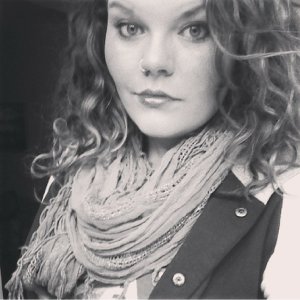 Stephine Deeren doesn’t just go to work at Addiction Treatment Services. She fulfills her calling.
Stephine Deeren doesn’t just go to work at Addiction Treatment Services. She fulfills her calling.
Her job as a detox care coordinator can be stressful, but Deeren, a 2013 NMC graduate, says that it’s worth it for the chance to help clients individually as well as to change community stigmas about substance abuse.
“It’s really rewarding in that you’re really making a difference,” she said.
What goes around, comes around. Back in high school, Deeren, now 26, was selected as an NMC Commitment Scholar. Since 1993, NMC has offered full-tuition Commitment Scholarships to promising first-generation college students who might not have the means to attend otherwise. The goal: to make a difference in their lives.
The class of 2019 will be inducted next week. Consisting of 113 students from schools throughout the Traverse Bay Area Intermediate School District, it’s the largest Commitment class ever.
It’s a pivotal moment for those students, said Deeren. Her career path began with an Introduction to Psychology class at NMC. She’s now pursuing her bachelor’s degree through Grand Valley State University at NMC’s University Center, and she eventually plans to get her master’s in social work.
“That’s where I found out what I wanted to do, was my first two years at NMC,” she said. “It really allowed me to have that self-discovery that I needed.”
Like Deeren, each student entering Commitment next week will have a chance for a full-tuition scholarship by meeting graduation and grade point requirements. For students outside Grand Traverse County, the value is up to $25,000. Commitment Scholarships are funded through the NMC Foundation and are a priority area for the college.
More than 1,000 students have gone through Commitment, with 91 percent completing the requirements.
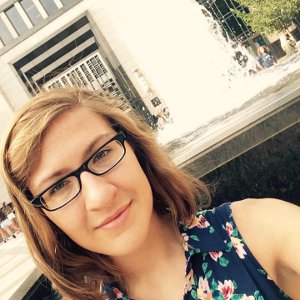
Emily Sklodowske is another alumna.
“It was so significant. It was a huge turning point for me,” said the 2007 graduate of Benzie Central High School.
Sklodowske decided to try going away to school first. But after a year at Ferris, she returned to NMC where her Commitment scholarship was still available.
After a year here, Sklodowske was approved to use remaining scholarship funds on a study abroad trip to Italy. That hooked her on international travel and set the course for her career path.
“I knew, after Italy, that I had to go back. I had to keep doing that,” she said.
She now works at Passageways Travel in Traverse City and is planning a trip to Costa Rica in December. Her advice to incoming Commitment scholars? Do everything they can to maximize the opportunity.
“ I would go right straight to NMC after high school, if I could go back and change that,” she said, citing the “top-notch” faculty, classes and experiences she found on campus. “This is something you need to take advantage of.”
Nov 27, 2022 | Intercom
May 18, 2016
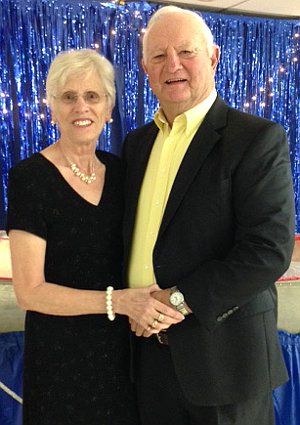 Amid the throngs bent on a buffalo burger, Cupid once shot an arrow.
Amid the throngs bent on a buffalo burger, Cupid once shot an arrow.
On Sunday, his targets — Art McManus and Judy Couturier — plan to attend their 55th NMC Barbecue. They had their first date at the 1962 event (pictured below).
“My girlfriend and I were riding through town, and we met him and his friend. And he asked me to go to the Barbecue the next day,” recalled Judy, who was then 18.
There must have been something in the air besides the scent of barbecue. Six months later, Art and Judy were married. As they embarked on a life raising three children, running a family cherry farm, and professional careers, they always kept the Barbecue date on their calendar.
“Rain, sleet or snow, we’ve been there,” she said. “We just have never missed one.”
The McManuses fill the day with tradition, from visiting the classroom displays to the cakewalk to the newer “buffalo cam” photo opportunity. (Granddaughter Alica Revett is pictured at last year’s event below.) Their entourage has grown from two to as many as 17, now extending to a third generation.
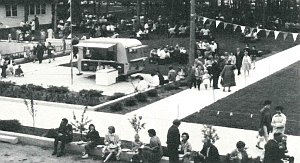 They support NMC for the opportunities it offers residents. All three of their children attended NMC, with one attending Ferris State University through the University Center as well. A grandson is currently enrolled in Davenport University at NMC’s University Center.
They support NMC for the opportunities it offers residents. All three of their children attended NMC, with one attending Ferris State University through the University Center as well. A grandson is currently enrolled in Davenport University at NMC’s University Center.
“It’s a good thing for the community,” Judy McManus said. “It’s good that (NMC) has all these other universities and colleges that participate with them. It makes it easier for the kids.”
Their Barbecue commitment will be tested this year. The McManuses will be celebrating their granddaughter’s hockey championship at a Tigers game in Detroit Saturday. But they’ll be up bright and early Sunday morning, headed home for the annual picnic under the pines.
“It’s a tradition. We can’t miss it,” Judy McManus said.
Nov 27, 2022 | Intercom, Student News
October 28, 2020
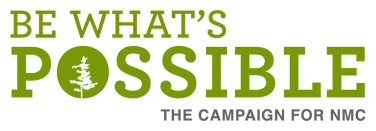 Emergency temporary housing for three NMC students. Steel-toed boots that enabled a welding student to stay enrolled. Internet hotspots for students who suddenly needed to attend classes virtually. All were made possible this year through the NMC Foundation’s Be What’s Possible $35 million fundraising campaign.
Emergency temporary housing for three NMC students. Steel-toed boots that enabled a welding student to stay enrolled. Internet hotspots for students who suddenly needed to attend classes virtually. All were made possible this year through the NMC Foundation’s Be What’s Possible $35 million fundraising campaign.
Such direct, crisis relief funding was possible because of the campaign’s comprehensive design, a decision made in 2016. Back then, launching Be What’s Possible seemed ambitious: It’s 10 times the size of any previous NMC campaign, and aimed at multiple priorities simultaneously, instead of a specific capital project.
Then the coronavirus hit just six months after the final, public phase was announced in October 2019. The ambitious, comprehensive campaign proved to be exactly the solution for students weathering the pandemic.
One of the campaign’s four priorities, The Fund for NMC, is dedicated to the college’s most urgent needs. That fund immediately pivoted to crisis relief. Dollars directed to the Office of Student Life paid for the three students’ short-term hotel stays, until more permanent solutions were found.
“I was going to be staying in my truck, sleeping in my vehicle,” said Elyce Newcomb, a culinary student from Sault Ste. Marie who received housing assistance in September. “I didn’t want to leave my college classes.”
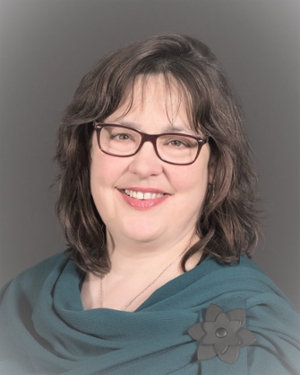 “(The pandemic) shifted the priority message to student support,” said campaign coordinator Carly McCall (left). “It really shifted the attention onto general, unrestricted support.”
“(The pandemic) shifted the priority message to student support,” said campaign coordinator Carly McCall (left). “It really shifted the attention onto general, unrestricted support.”
NMC’s Office of Financial Aid was another vehicle to route assistance.
“We were able to take those dollars raised, and transfer them, through financial aid, directly to the students,” said Rebecca Teahen, associate vice president of resource development.
That opportunity to directly support students resonated with donors like Bob and Kathy Garvey of Williamsburg, new NMC donors this year.
“After COVID it was health, food, education. Those things sort of came to the forefront in terms of our giving,” said Bob Garvey. A newspaper story he read on student needs propelled the semi-retired lawyer to donate to support NMC scholarships.
“A lot of students are in service jobs, and I thought, ‘Man, these kids are between a rock and a hard place.’ ” Garvey said.
Many other donors thought the same thing. April 2020 became the Foundation’s fifth highest donor month ever. The second quarter of 2020, with more than 1,300 donors, was its second-highest quarter ever. Teahen said the “significant participation” was a silver lining to the pandemic.
“We know that philanthropy and giving is a way to connect, connect with your community and connect neighbors,” she said.
It’s never been more critical. The three housing requests are an indicator of how dire community need is due to COVID. Prior to 2020, Dean of Student Life Lisa Thomas said she’s housed just one student. But community programs and agencies she would normally rely on are pinched for funds, volunteers and time.
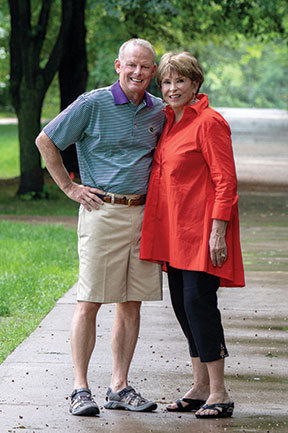 Now the ambitious Be What’s Possible campaign, co-chaired by NMC alumni Bruce Byl and Susie Janis (right), is looking eminently doable, with just $3 million left to raise. That makes all kinds of things possible for NMC in the future.
Now the ambitious Be What’s Possible campaign, co-chaired by NMC alumni Bruce Byl and Susie Janis (right), is looking eminently doable, with just $3 million left to raise. That makes all kinds of things possible for NMC in the future.
“It changes the nature of how we can operate, to know that this community can support on that level,” McCall said.
Be What’s Possible expects to achieve its goal and conclude in the first half of 2021. In addition to the college’s most urgent needs, supported by The Fund for NMC, and scholarships, which the Garveys donated to, the priorities include:
- Innovative Facilities – To create places where students and the community can connect to resources and with each other. Focused on the Timothy J. Nelson Innovation Center and the expansion of the Dennos Museum, gifts for other facilities are also welcome.
- Strong Programs – To stay at the forefront of educational innovation and drive economic growth through top-notch learning opportunities in all areas, from language arts to engineering technology.
“It allows donors to give in the way that makes sense for them,” Teahen said. “People want to help. Even when times are tough, they want to have a way to help their community.”
 The Voices Project, a new experiential learning project in conjunction with NMC’s Embrace the Dream Martin Luther King/Black History Month programming, aims to elevate the recognition of lesser-known individuals throughout history, like Capt. Hugh Mulzac, journalist Ida B. Wells-Barnett and nurse Mary Eliza Mahoney.
The Voices Project, a new experiential learning project in conjunction with NMC’s Embrace the Dream Martin Luther King/Black History Month programming, aims to elevate the recognition of lesser-known individuals throughout history, like Capt. Hugh Mulzac, journalist Ida B. Wells-Barnett and nurse Mary Eliza Mahoney.
 Wolff was able to obtain permission for 17 images. Other portrait subjects are research chemist Percy Julian, mathematician Gladys West and artist and illustrator Aaron Douglas. Wolff’s drawing students are now working on sketches for another five subjects for whom permission could not be obtained.
Wolff was able to obtain permission for 17 images. Other portrait subjects are research chemist Percy Julian, mathematician Gladys West and artist and illustrator Aaron Douglas. Wolff’s drawing students are now working on sketches for another five subjects for whom permission could not be obtained.

 How do you get girls interested in STEM (Science, Technology, Engineering and Math) fields?
How do you get girls interested in STEM (Science, Technology, Engineering and Math) fields? Due to their accreditation requirements, health programs like
Due to their accreditation requirements, health programs like  Despite a mostly virtual year,
Despite a mostly virtual year, 


 In 2010, UAS, also known as drones, were chiefly a military tool. But Tony Sauerbrey, left, then NMC’s chief flight instructor, and others in the college’s traditional manned Aviation program spied opportunity ahead.
In 2010, UAS, also known as drones, were chiefly a military tool. But Tony Sauerbrey, left, then NMC’s chief flight instructor, and others in the college’s traditional manned Aviation program spied opportunity ahead.
 Add up an NMC associate degree, a thin credit history, a stint in the Navy and a love of travel and you get Harvard University sophomore Alex Walsh (NMC 2012), who will start classes in Cambridge, Mass. next week.
Add up an NMC associate degree, a thin credit history, a stint in the Navy and a love of travel and you get Harvard University sophomore Alex Walsh (NMC 2012), who will start classes in Cambridge, Mass. next week. “This path” started with participating in a wide range of activities and clubs at NMC, including NMC magazine, the White Pine Press, Anime Club, International Club and the NMC Policy Council. (NMC yesterday hosted Pine Palooza, an annual fair that introduces students to dozens of campus groups and organizations.) Walsh was also a member of Phi Theta Kappa, the international community college honor society. He credits PTK adviser Kari Kahler and instructors Jim Bensley, Amjad Khan and John Zachman as among his NMC mentors.
“This path” started with participating in a wide range of activities and clubs at NMC, including NMC magazine, the White Pine Press, Anime Club, International Club and the NMC Policy Council. (NMC yesterday hosted Pine Palooza, an annual fair that introduces students to dozens of campus groups and organizations.) Walsh was also a member of Phi Theta Kappa, the international community college honor society. He credits PTK adviser Kari Kahler and instructors Jim Bensley, Amjad Khan and John Zachman as among his NMC mentors. Patrons enjoying the traditional buffalo burger and kids games might also notice a giant crane and the steel beamed-frame of a rising second story on the Timothy J. Nelson Innovation Center at the annual NMC Barbecue this Sunday.
Patrons enjoying the traditional buffalo burger and kids games might also notice a giant crane and the steel beamed-frame of a rising second story on the Timothy J. Nelson Innovation Center at the annual NMC Barbecue this Sunday. The Barbecue traditions of free live entertainment, classroom displays and program exhibits, and free admission to the Dennos Museum Center will all return. New at the Barbecue is the first annual printmaking sale, set for 11 a.m.-5 p.m. in the Fine Arts Building. Patrons can take home a student print for as little as $3.
The Barbecue traditions of free live entertainment, classroom displays and program exhibits, and free admission to the Dennos Museum Center will all return. New at the Barbecue is the first annual printmaking sale, set for 11 a.m.-5 p.m. in the Fine Arts Building. Patrons can take home a student print for as little as $3. 
 “So many of us have experienced education as something that’s being shoved into us,” said Steve Rice, an accounting instructor at NMC and the author of an innovation grant that allowed a seven-member team to be trained in the style in 2015. The goal is to empower students to solve their own problems, as Byers did.
“So many of us have experienced education as something that’s being shoved into us,” said Steve Rice, an accounting instructor at NMC and the author of an innovation grant that allowed a seven-member team to be trained in the style in 2015. The goal is to empower students to solve their own problems, as Byers did. For more than three decades, Traverse City resident Dick Grout (right) has pushed NMC’s mission to provide lifelong learning opportunities to its outer limits.
For more than three decades, Traverse City resident Dick Grout (right) has pushed NMC’s mission to provide lifelong learning opportunities to its outer limits.

 Another lesson: Deliberately step out of your comfort zone. Hurlbert practiced this from day one of his trip, which at 65 miles was twice as far as he’d ever ridden before.
Another lesson: Deliberately step out of your comfort zone. Hurlbert practiced this from day one of his trip, which at 65 miles was twice as far as he’d ever ridden before. After investing more than 10 years in pursuit of her associate degree, the pandemic almost brought psychology student Brandee Sasser-Drone (left) to her breaking point, but federal aid distributed by NMC has kept her on track to graduate this semester and continue toward a bachelor’s degree.
After investing more than 10 years in pursuit of her associate degree, the pandemic almost brought psychology student Brandee Sasser-Drone (left) to her breaking point, but federal aid distributed by NMC has kept her on track to graduate this semester and continue toward a bachelor’s degree. Inuit art lovers Dudley and Barb Smith know their collection intimately.
Inuit art lovers Dudley and Barb Smith know their collection intimately. Per their estate plans, eventually the expanded gallery will house the walrus, the caribou, and the rest of the Smiths’ collection, which reflects both Barb Smith’s affinity for animal imagery and Dudley’s for the native people.
Per their estate plans, eventually the expanded gallery will house the walrus, the caribou, and the rest of the Smiths’ collection, which reflects both Barb Smith’s affinity for animal imagery and Dudley’s for the native people.

 First comes love, then comes marriage. Then comes a baby carriage, satisfying careers, buffalo burgers, saving money through dual enrollment, and supervising the beanbag toss.
First comes love, then comes marriage. Then comes a baby carriage, satisfying careers, buffalo burgers, saving money through dual enrollment, and supervising the beanbag toss. Fast-forward a few decades. The couple’s youngest son, Jackson, a senior at Traverse City West, is now
Fast-forward a few decades. The couple’s youngest son, Jackson, a senior at Traverse City West, is now  Stephine Deeren doesn’t just go to work at Addiction Treatment Services. She fulfills her calling.
Stephine Deeren doesn’t just go to work at Addiction Treatment Services. She fulfills her calling.
 Amid the throngs bent on a buffalo burger, Cupid once shot an arrow.
Amid the throngs bent on a buffalo burger, Cupid once shot an arrow. They support NMC for the opportunities it offers residents. All three of their children attended NMC, with one attending Ferris State University through the University Center as well. A grandson is currently enrolled in Davenport University at NMC’s University Center.
They support NMC for the opportunities it offers residents. All three of their children attended NMC, with one attending Ferris State University through the University Center as well. A grandson is currently enrolled in Davenport University at NMC’s University Center. Emergency temporary housing for three NMC students. Steel-toed boots that enabled a welding student to stay enrolled. Internet hotspots for students who suddenly needed to attend classes virtually. All were made possible this year through the NMC Foundation’s
Emergency temporary housing for three NMC students. Steel-toed boots that enabled a welding student to stay enrolled. Internet hotspots for students who suddenly needed to attend classes virtually. All were made possible this year through the NMC Foundation’s  “(The pandemic) shifted the priority message to student support,” said campaign coordinator Carly McCall (left). “It really shifted the attention onto general, unrestricted support.”
“(The pandemic) shifted the priority message to student support,” said campaign coordinator Carly McCall (left). “It really shifted the attention onto general, unrestricted support.” Now the ambitious Be What’s Possible campaign, co-chaired by NMC alumni Bruce Byl and Susie Janis (right), is looking eminently doable, with just $3 million left to raise. That makes all kinds of things possible for NMC in the future.
Now the ambitious Be What’s Possible campaign, co-chaired by NMC alumni Bruce Byl and Susie Janis (right), is looking eminently doable, with just $3 million left to raise. That makes all kinds of things possible for NMC in the future.